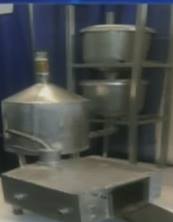-
Posts
53 -
Joined
-
Last visited
Content Type
Profiles
Forums
Events
Posts posted by Haya
-
-
Yes just like they. If you were measuring the temperature (or volume and pressure) of the internal volume you would also have the auto ignition temperature (assuming it didn't very with pressure).
You should look at the ideal gas law, pV=nRT.
I am sorry but i can't understand well, my original language is not English.
Do you mean that the flash point/heat of combustion is itself the auto-ignition temperature? Do i do the experiment using a bomb calorimeter?
0 -
Add material or reduce the volume. The cloud in a bottle demonstration (see YouTube) works by raising the temperature by pumping in air.
Probably the easiest way to find auto ignition temp is experimentally.
About the pressure .... do you mean like this?
And about the auto-ignition, i do know that i must do an experiment, but i don't know how.
I don't know the tools, the practice ....etc, i need to know.
Thank you
0 -
If i have a closed system and i want to raise its temperature by raising the pressure to make an autoignition process, how do i control pressure and raise it?
And please, what are the methods to determine the autoignition temperature of a solid substance?
Note: I am just 16 years old and i am doing a scientific research for a competition, so i need help, please.
Thanks in advance..
0 -
OK so it is still work you are going to claim as your own.
However we also want to encourage interest in science and engineering so I will start some help in this way.
In engineering we very often use what is known as 'black box theory'.
That is we draw a box around something and do not worry what goes on inside, just consider the inputs and outputs.
So for our wastewater plant in the black box, can you fill in the words represented by question marks and then think about the following questions.
The water enters the plant in one state and leaves in another. What other inputs or outputs might there be and what does that have to do with the states of the water?
This will lead to the answer to your first question about turbidity.
Can you list the different groups (of people) who are interested in what goes into or out of the plant (or both) and what there interests might be.
This will lead to the answer to your other three questions.
Thank you so much! I got benefit of that!
But please, what is the difference between Total Dissolved Solids (TDS) and total heavy metals? And the coagulant should remove both of them in addition to the organic matters, shouldn't it?
Excuse me, may i ask you a question out of this topic? Why gases separation by density is high-cost? Does it require high energy/temperature for separation process?
0 -
Is this homework/coursework?
Even if, I find it very demanding.
This is a scientific research that i am doing to enroll a competition, i am just 16 years old so i need some help, please..
0 -
Where did you read about it? Can you provide a link to what you read?
Very high pressure without expenditure of very high power.
Sounds very witchy to me, almost like magic.

That's how a diesel engine works! Instead of having a sparkplug to ignite the gas mixture, the piston compresses the gas mixture enough that the increase in termperature ignites it. There is no expenditure of energy to create a spark and, once the engine has started, the energy from the previous ignition cycle is used to compress the next cycle. Of course, diesel engines are notoriously hard to start!
The maximum thermal efficiency of a diesel engine is 56% so more than half the power is wasted.
I don't call that without expenditure of high power.
Compression ignition, though compression itself takes energy.
Thank you all. So, it is called compression ignition.
0 -
What is the required-to-determine parameters for the test of a water turbidity coagulant? And what are the standards for a coagulant practice?And what are the differences between compliance monitoring, performance monitoring, and control process in wastewater treatment? With references, please...
Thanks in advance...
0 -
I have read about a technique that uses very high pressure so that temperature gets very high in order not to use any type of power or energy and the selected thing burns....may any one explains me more details about this technique, what is it called, how true is it because i have a doubt about it.
Thanks in advance..
0 -
So what?
So, i want to know about this technique.
0 -
If it was real then it would be all over the scientific press by now.
There was a doctor told me that, too. But this was applied by a junior student at Intel ISEF competition and she received a top award for it.
0 -
-
what is the rang of the cost of high temperature gas separation by membranes(i have a lot of heat in my research) ? what is the cost of gas separation by membranes in general? Where can i get those membranes or made them?
0 -
Good luck with finding a backer.
No, you know someone who says they can do it for a few dollars.
okay .... thank you so much for helping me!
0 -
The most economic methods of achieving this are based on gas scrubbing. (see https://en.wikipedia.org/wiki/Scrubber)
But that does not make them necessarily profitable, There are generally cheaper methods of generating these gases.
Separation by density difference is a very expensive method, and very limited in its application.
very expensive!! i know someone who did this with a cost up to only 5 or 6 dollars!! here is the device which this one made :(click on the photo so that you can see it clearly:
0 -
Which gases are you wanting to separate?
Are you researching uranium enrichment?
i want to separate gases produced from the combustion of organic matters (co2, h2o, and other minor gases)to benefit from each one at a time.
0 -
Hi,
i am a junior student doing a research to take part in a world competition, a very important chapter of my research paper depends on gases separation to benefit from each one at a time, i searched about gases separation techniques but i found most of them very expensive and complex. Lately, i found out a method depends on an electronic device that separates gases according to their different densities under high temperature amounts to 1200 C in a closed system. Please could any one recommend me a book/reference/research paper/any thing explain me this technique or any thing explains gases separation by density in general because i strongly need it.
Thanks in advance...
0 -
Where have you searched? These topics are incredibly broad and looking into any search engine for papers you get easily hundreds of thousands of hits.
Hard to say as OP has not provided a specific context. Wastewater management is almost always talked about in an environmental context, for example. So theoretically one could simply use that as a term and get overwhelmed. Lit often deals with specific aspects, like e.g. specific contaminants or specific environments, or specific wastewater sources or specific treatments etc.
Same goes with "contaminated water". What contamination? Feces, hazardous material, mining effluencts, specific bacteria etc. etc.
Maybe give the OP some search terms would help? Often, people don't know what to ask Google to get what they want.
Where have you searched? These topics are incredibly broad and looking into any search engine for papers you get easily hundreds of thousands of hits.
i googled what i need and you are right, information is everywhere but i need ( scientific, trusted ) reference, this one of the rules of doing a scientific research so i need books not websites. In addition, i am a junior student and i am doing a scientific research for the first time in my life to take part in a competition, so i have some problems about scientific references.
0 -
Hi,
please recommend me any article/book/any scientific reference talks about effects of wastewater on environment, and another talks about effects of drinking contaminated water on human health; because i searched but i couldn't find what i need for my research in environmental engineering.
Thanks in advance...0 -
I don't understand a word of Arabic. Is there anything there that mentions a university or a researcher's name?
the girl is called Yasmeen Yehia Mustafa, this is only mentioned, thank you very very much, you helped me a lot !
the girl is called Yasmeen Yehia Mustafa( a junior or a senior student as i think), this is only mentioned, thank you very very much, you helped me a lot !
0 -
Where did you find out about it?
this method is applied by an Arabic girl (minute:10.30)but the video is Arabic:
0 -
Where did you hear about it?
It's news to me.
yes it is new but unfortunately this is what all i could know about it.
0 -
Separating gases by density is very difficult.
https://en.wikipedia.org/wiki/Gas_centrifuge
What are you trying to do?
i am trying to separate these gases to benefit from each one of them, but when is searched about gases separation techniques and i found them expensive and complex and i lately heard about an electronic device does this mission according to densities differences , it is fairly cheap and simple and i need to read more about is : what is this method/technique called ?what good books talk about them?
0 -
thank you so much but this is not what i need to know, what i need is : there is a cheap electronic device separates gases according to their different densities, what is this method/technique called ? what are good,easy-to-understand books talk about it?
0 -
if i burn organic matters in a closed system, it produces carbon dioxide, water steam, a lot of heat, and other minor gases. my question is : how to separate these gases from each other ? i have heard about an electronic device used for this mission according to densities differences. what is this technique called ?and i need a good,easy-to-understand book about it. thanks in advance...
0




what is the meaning of waste stabilization?
in Biology
Posted · Edited by Haya
Hi,
please can anyone tell me what is the meaning of waste stabilization? I am doing a research about the anaerobic digestion of food waste and i don't know what that definition means.
Note: i am just 16 years old because i know that someone may considers my question very easy to answer but i really need help.
Thanks in advance!